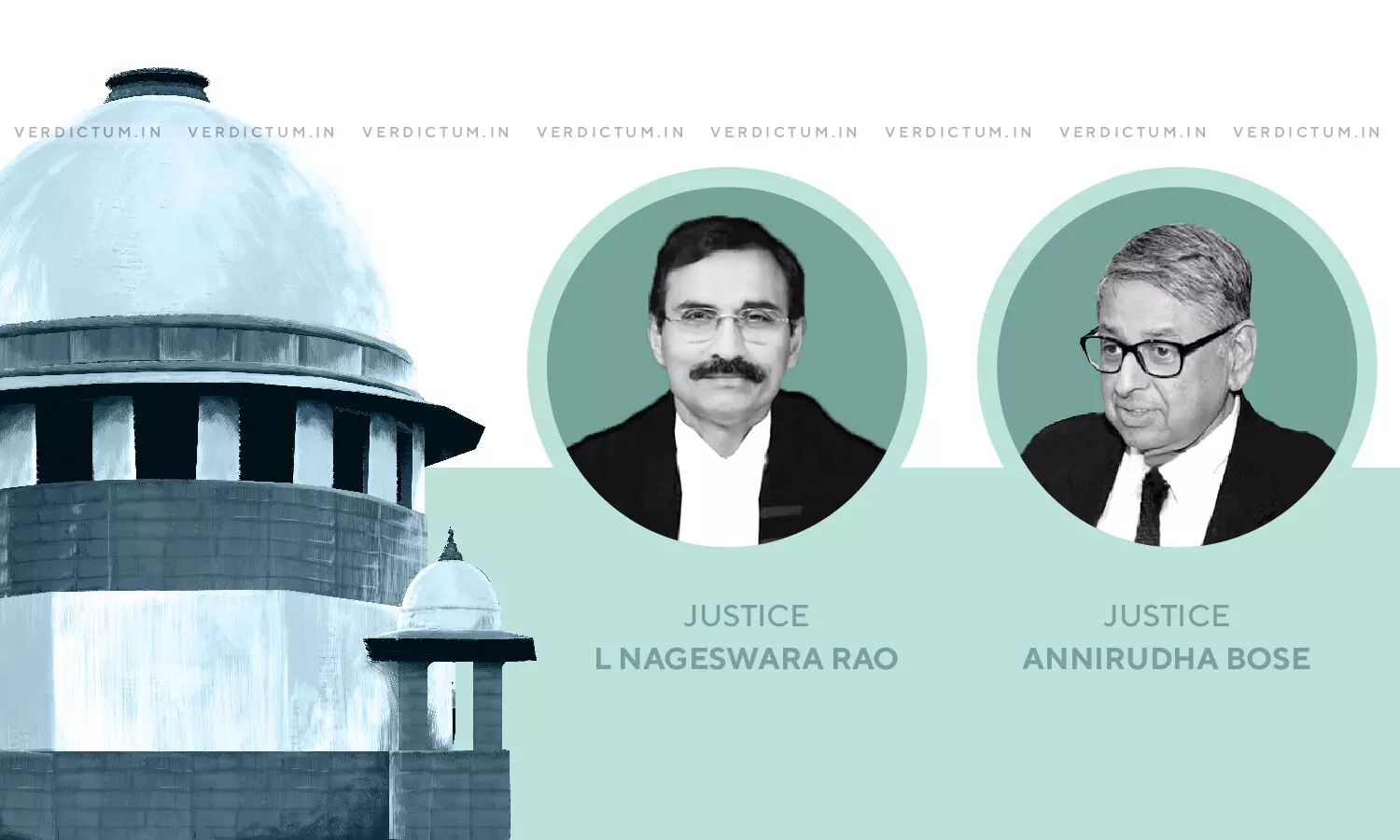
Rule 14 Of CCS (CCA), 1965 – Charge Memo Issued Without Approval Cannot Be Validated Retrospectively: Supreme Court
 |
|A two-judge Bench of Justice L Nageswara Rao and Justice Aniruddha Bose while referring to Rule 14 of Central Civil Services (Classification, Control and Appeal) Rules, 1965 has held that sub-clauses (2) and (3) of the Rule contemplate independent approval of Disciplinary Authority for initiation of disciplinary enquiry.
The Supreme Court has further held that not having approval at the time of issue of charge memorandum under subclause (3) of the Rule would render the memorandum fundamentally defective, not capable of being validated retrospectively.
In this case, the Appellant was an Assistant Commissioner of Income Tax against whom disciplinary proceedings were initiated and a charge memorandum was also issued under Rule 14 of CCS (CCA). It was alleged that he along with Deputy Commissioner of Income Tax had conducted a survey under Section 133A Income Tax Act in five proprietary group concerns of an individual and demanded a sum of rupees five lacs other than legal remuneration from the said individual through his advocate for settling the matter.
It was further alleged in the articles of charge that he, along with the said Deputy Commissioner, had demanded a sum of rupees two lacs other than legal remuneration from the same individual, and later on, the Deputy Commissioner accepted the said amount.
The Charge Memorandum which was issued was not specifically approved by the finance minister. Thereafter, the Appellant instituted several proceedings contending several irregularities in CAT and High Court.
The Appellant relied upon the judgment of B.V. Gopinath vs. Union of India where it was held, while examining the same Rule, that in absence of the approval of the charges by the competent authority, further proceedings in the disciplinary case could not be sustained.
Placing reliance on the aforementioned judgment, the Appellant approached CAT for quashing of charge memorandum. The Tribunal disposed of the application by giving liberty to the Appellant to raise the point before the Disciplinary Authority. However, the authority did not consider the contention of the Appellant and the latter instituted another proceeding before the Tribunal.
By an OM, the Appellant was informed that the charge memorandum had been duly approved by the Disciplinary Authority and proceedings could continue from the stage where it stood before the memorandum was approved.
However, this OM was quashed by the Principal Bench of CAT on the ground that such approval could not have been granted ex-post facto as the approval was given on 8th January 2014 to a charge memorandum of 18th November 2002. The authorities were given the liberty to issue a fresh memorandum of charges under Rule 14.
This was challenged by the Union before the Delhi High Court which examined the matter relating to the issue of whether, under the Rule, the charge memorandum could be given ex-post facto approval or not.
The High Court made a distinction between the present case and BV Gopinath's case on the ground that in the case of the appellant, the Disciplinary Authority had not granted approval at any stage and in the present case, ex-post-facto sanction of the charge memorandum or chargesheet was given when the departmental proceeding was pending.
The Respondents contention before the High Court was that there was no bar on giving ex-post factor approval by the Disciplinary Authority to a charge memorandum.
The Apex Court noted, "We do not think that the absence of the expression "prior approval" in the aforesaid Rule would have any impact so far as the present case is concerned as the same Rule has been construed by this Court in the case of B.V. Gopinath (supra) and it has been held that chargesheet/charge memorandum not having approval of the Disciplinary Authority would be non est in the eye of the law."
"The distinction between the prior approval and approval simplicitor does not have much impact so far as the status of the subject charge memorandum is concerned," the Bench opined.
Further, the Court observed, "In the event a legal instrument is deemed to be not in existence, because of certain fundamental defect in its issuance, subsequent approval cannot revive its existence and ratify acts done in pursuance of such instrument, treating the same to be valid. The fact that initiation of proceeding received approval of the Disciplinary Authority could not lighten the obligation on the part of the employer (in this case the Union of India) in complying with the requirement of sub-clause (3) of Rule 14 of CCS (CCA), 1965."
"What is non-existent in the eye of the law cannot be revived retrospectively. Life cannot be breathed into the stillborn charge memorandum. In our opinion, the approval for initiating disciplinary proceeding and approval to a charge memorandum are two divisible acts, each one requiring independent application of mind on the part of the Disciplinary Authority," the Court held.
Additionally, the Court added, "If there is any default in the process of application of mind independently at the time of issue of charge memorandum by the Disciplinary Authority, the same would not get cured by the fact that such approval was there at the initial stage."
The Court also held that the allegations against the Appellant were serious in nature and ought not to be scuttled on purely technical ground. The Department's power to pursue the matter had been reserved and not foreclosed.
The Court further directed that since the incident relates to 1998 and the proceeding was initiated in 2002 and if the department wants to continue with the matter and on producing the material the Disciplinary Authority is satisfied, a fresh memorandum of charge be issued and the proceedings shall take its own course thereafter.
In the light of these observations, the Court set aside the impugned judgment of the High Court and restored the judgment of the Principal Bench of CAT.
Click here to read/download the Judgment